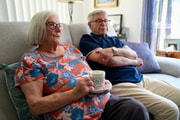
Content Warning: This article discusses end-of-life care and voluntary assisted dying.
Aged care in Australia is on the brink of a transformation, but one glaring problem has been exposed.
Most residential facilities are failing to provide older Australians with essential information about their legal end-of-life options.
Families are being left in the dark, often learning about crucial choices far too late.
With major reforms to the Aged Care Act set to commence on 1 November 2025, residents will soon gain stronger rights and protections than ever before.
Just two days later, voluntary assisted dying (VAD) laws will come into effect in the ACT, completing the legal framework across every state and territory except the Northern Territory.
Yet a disturbing new study presented at the Ageing Australia Conference revealed that despite VAD being legal nationwide, only 15 per cent of residential aged care providers offered access to VAD or supplied any information about it to residents.
Conducted by Go Gentle Australia in partnership with OPAN (Older Persons Advocacy Network), the research exposed critical information gaps that are leaving older Australians to make life-altering decisions without full knowledge.
In this article
The shocking scale of the problem
The study examined 72 providers responsible for caring for almost 70 per cent of the national residential aged care population, making it one of the most comprehensive investigations into this issue.
Only four providers—just 5 per cent—gave residents and their families 'comprehensive information and full access to VAD.'
'Older people have a legal right to know about VAD, where it is available and what support will be offered at the end of life.'
This means 85 per cent of aged care homes either do not provide VAD access or fail to inform residents about the legal option, despite it being available across the country.
Dr Linda Swan highlighted the human cost of this information gap, recounting conversations with residents who only discovered VAD when it was 'too late,' and families whose loved one's suffering was prolonged unnecessarily.
The lack of information has forced some frail and ill residents to move from their homes simply to access VAD—a traumatic disruption that could often be avoided with proper planning and transparency.
Understanding the legal landscape
These findings come as the aged care sector prepares for its most significant legal overhaul in decades.
The new Aged Care Act, effective 1 November 2025, will introduce a rights-based framework designed to place residents’ choices at the centre of care delivery.
Currently, residential facilities must allow all residents—whether temporary or permanent—to access information about VAD, including facilitating it if a resident requests details.
They are also required to provide access to qualified health practitioners or other relevant individuals who can explain VAD or respond to requests.
VAD by the numbers
More than 8,000 people have applied for VAD since it first became legal in Victoria in 2019, with applications increasing in all states over time.
Approximately 75 per cent of people accessing VAD were 65 or older, and over 80 per cent had cancer, emphasising why aged care residents need access to comprehensive end-of-life information.
Real-world impact on families
Craig Gear, CEO of OPAN, stressed that the issue is not about taking a stance for or against VAD, but about ensuring older Australians and their families have the clarity needed during profoundly personal times.
'Residential aged care is someone's home,' he explained, noting that inadequate information is particularly harmful for residents in rural and regional areas, where relocation to access VAD can be both 'harmful and unrealistic.'
Clear communication from providers helps older Australians avoid distressing and unnecessary transfers.
Families already navigating terminal illness face additional trauma when loved ones must relocate simply to exercise legal rights, a burden that could be minimised with transparent information.
What comprehensive information looks like
The report identified a small number of providers as examples of best practice, including Uniting ACT.NSW and OneCare Tasmania, which gave comprehensive public information and direct access to VAD.
Best practice provider approach
- Clearly state their position on VAD on their website and in admission materials
- Explain exactly what services they can and cannot provide
- Outline support for residents who choose VAD, even if the provider does not participate directly
- Provide information about external support services and care navigators
- Explain processes for arranging transfers if required
- Offer clear timelines and contact details
Your rights as a consumer
Australian Consumer Law and aged care legislation guarantee residents the right to make informed choices about care and accommodation.
Questions to ask aged care providers
- What is the facility’s specific policy on voluntary assisted dying?
- How do you support residents who wish to explore end-of-life options?
- What information do you provide about external VAD services and care navigators?
- What is your process if a resident’s preferences change after admission?
- How do you facilitate access to VAD services if you do not provide them directly?
Did you know?
Did you know? VAD care navigators exist in all states to provide free support and advice to people accessing or seeking access to VAD, their families, carers, and health professionals—even if the residential facility does not participate directly.
November 2025: a new era for aged care rights
The new Aged Care Act introduces a 'rights-based framework,' prioritising residents’ choices over provider and funding considerations.
For VAD, the combination of strengthened aged care rights and the ACT’s new laws marks a pivotal change in how end-of-life issues are addressed nationwide.
Regional challenges require creative solutions
Regional and remote Australians face particular difficulties when aged care providers do not supply comprehensive VAD information.
Alternatives may require relocation, sometimes hundreds of kilometres from family or community supports.
Telehealth offers a potential solution, though federal laws currently create barriers, and recent court rulings have clarified that some telehealth consultations for VAD may not be legally permissible.
This makes transparency from local providers essential, allowing residents and families to plan ahead.
Moving forward: what this means for you
What This Means For You
Only 15 per cent of Australian residential aged care providers currently offer access to voluntary assisted dying (VAD) or provide information about it, leaving the vast majority of seniors without guidance on this important legal option.
The new Aged Care Act and ACT VAD laws, coming into effect in November 2025, are designed to strengthen residents’ rights and ensure they have access to the information and support they need.
However, the current lack of transparency means some residents are forced to relocate from their homes to access VAD, creating unnecessary trauma and stress for both them and their families.
Providers that follow best practice clearly communicate their policies, offer support to residents exploring end-of-life options, and connect families with external resources, setting a standard that all aged care facilities should aspire to.
For seniors and their families, understanding these gaps is crucial—knowing which providers are transparent about VAD can make the difference between a stressful, disempowering experience and one where end-of-life choices are respected and supported.
If you want to explore how end-of-life choices are managed in more complex medical situations, there’s a detailed story that sheds light on this issue.
It looks specifically at cases where cognitive conditions affect decision-making, highlighting the legal and practical challenges involved.
Following this piece can give a clearer picture of what options are available and how families navigate these difficult decisions.
Read more: What voluntary assisted dying options are available for those with dementia?
New Aged Care Act | Aged Care Quality and Safety Commission — Provides official information about the new Aged Care Act, which will commence from 1 November 2025, outlining changes to residents’ rights and care standards.
https://www.agedcarequality.gov.au/about-us/legislation-and-policies/new-aged-care-act
Voluntary Assisted Dying—End of Life Law in Australia—QUT — Explains the legal framework for voluntary assisted dying in Australia, including that VAD laws will commence in the ACT on 3 November 2025.
https://end-of-life.qut.edu.au/assisteddying
Residential Aged Care homes failing older Australians on end-of-life choice—News Hub — Reports on a study of 72 providers caring for nearly 70% of the national residential aged care population, revealing that only 5% offer full access to VAD.
https://newshub.medianet.com.au/202...der-australians-on-end-of-life-choice/120877/
Many residential aged care homes aren't providing VAD information | The Senior — Highlights that over 8,000 people have applied for VAD since it became legal in Victoria in 2019, emphasising the growing need for information in aged care.
https://www.thesenior.com.au/story/...d-care-homes-arent-providing-vad-information/
Voluntary assisted dying will be available to more Australians this year. Here’s what to expect in 2023 — Notes that approximately 75% of people accessing VAD are 65 or older, and more than 80% have cancer, highlighting the relevance for aged care residents.
https://theconversation.com/volunta...this-year-heres-what-to-expect-in-2023-196209
Residential Aged Care homes failing older Australians on end-of-life choice—News Hub — Features best practice examples of providers such as Uniting ACT.NSW and OneCare Tasmania, who provide comprehensive VAD information and direct access for residents.
https://newshub.medianet.com.au/202...der-australians-on-end-of-life-choice/120877/
What questions will you be asking your aged care provider about their end-of-life policies?
[/p]






